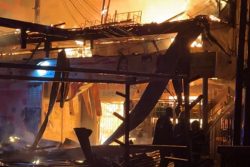NEW DELHI, (Reuters) – Cricket World Cup organisers said yesterday that no changes had been made to security arrangements after the Indian government’s warning of a possible militant attack on the showpiece event.
Just before the Feb 19-April 2 tournament reached the halfway mark, the government issued an alert on Wednesday over a possible attack on the tournament being played in 13 venues across India, Sri Lanka and Bangladesh, attracting hundreds of thousands of fans.
“We don’t comment on security issues. It’s completely under the jurisdiction of the government. They have taken steps to take care of everything,” tournament director Ratnakar Shetty told Reuters yesterday.
A Tamil Nadu Cricket Association (TNCA) official said there has been no recent beefing-up of security measures in and around the MA Chidambaram Stadium in Chennai which is staging India’s big match with the West Indies on March 20.
“We have made comprehensive security arrangements right from the warm-up matches and there has not been any change to that. It remains the same,” the TNCA official said.
A 2009 gunmen attack on the visiting Sri Lankan cricketers in Lahore shattered the myth that the athletes in the sub-continent enjoyed immunity of sorts against militancy.
Eight people died in the attack and six members of the Sri Lanka team were injured.
Since then, Pakistan, one of the original four co-hosts of the World Cup, has not hosted an international cricket match and every sports event in the region has been staged under the shadow of that attack.
The World Cup so far has seen no repetition of that sort but has not been without incidents either.
In India, ticket-seeking fans have been baton-charged by the police while the West Indies’ team bus was stoned in Mirpur, apparently by a handful of fans disappointed by Bangladesh’s defeat by Darren Sammy and his men.
Suraj Dandeniya, Sri Lanka’s tournament director of security, said the teams could concentrate solely on cricket in the island nation without bothering about their security.
“We have taken into account (what happened in Bangladesh) but we feel our security levels are good enough to prevent something like that from happening here in Sri Lanka,” Dandeniya told Reuters by telephone.
He, however, was not so sure if incidents like stone-pelting could be prevented.
“No matter how well you prepare, a stone can be thrown from far away, it’s difficult to prevent that. In life you can never say something can’t happen, there is always a possibility.”
World Cup players questioned said they had confidence in the security arrangements.
“The security that we’ve got here and in Bangladesh and Sri Lanka has been outstanding,” the Australian fast bowler Brett Lee said in Bangalore.
“There’s always a lot of police present. We have got the right people on the ground and in place. If there are any threats, we’ll definitely be knowing about it and it will be dealt with appropriately.
“Everyone’s happy and everyone’s comfortable with the way things are going as far as security goes,” said the fast bowler, a frequent visitor to India.
Kenyan batsman Tanmay Mishra also felt safe in the sub-continent.
“Security has been amazing. We have been looked after in Sri Lanka and now in India. We are happy with it,” the Mumbai-born middle order batsman told Reuters.
Security analyst Ajai Sahni did not think there was any specific threat to the event which he expected to pass without any real scare.
“You can’t possibly prevent minor incidents but it is highly unlikely that anything major would occur. That they have detected something in advance suggests high-level security arrangements have been put in place,” Sahni, executive director of the Institute for Conflict Management, said.
“(Of the host countries) Sri Lanka is better off (after its three-decade civil war ended in 2009) and the situation has improved in Bangladesh as well. In India too, such activities have considerably gone down in recent times,” Sahni pointed out.
International Cricket Council chief executive Haroon Lorgat said before the tournament in a telephone interview with Reuters that he was confident that all the necessary security arrangements were in place at that time.
“It’s in fact a non-issue,” he said.




